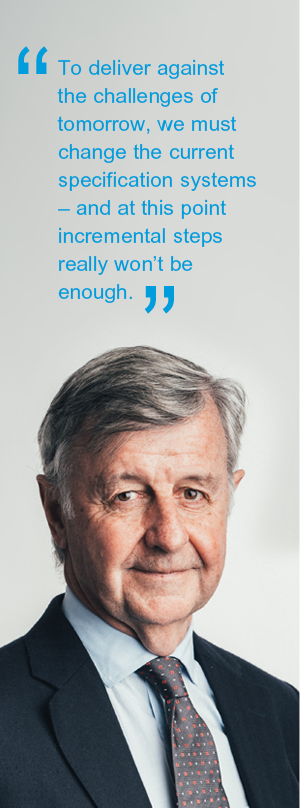Lubricant trends
Advances in automotive lubricant design
04 March 2025
17 February 2016
It is time to transform our approach to future industry lubricant specification developments

Xavier le Mintier, Infineum CEO, explains why the time is right to remove complexity from industry lubricant specifications and suggests a way forward that will give all stakeholders the opportunity to create a more innovative and prosperous future.
 In recent years I have witnessed unprecedented activity in the development of new lubricant specifications, which have consumed vast amounts of industry resource. Each new wave requires very significant investment in research, testing, manufacturing and distribution. In my view it is time for our industry to remove unnecessary complexity from these industry specifications so that our investments can be translated into real value.
In recent years I have witnessed unprecedented activity in the development of new lubricant specifications, which have consumed vast amounts of industry resource. Each new wave requires very significant investment in research, testing, manufacturing and distribution. In my view it is time for our industry to remove unnecessary complexity from these industry specifications so that our investments can be translated into real value.
I’m not saying all complexity is bad. I have seen good complexity result in an impressive evolution of the innovative content of additive packages and in the number of potential options for customers. But, I firmly believe that where we see unnecessary complexity we should fight for simplification and specification development is the first area we should tackle.
ACEA, API and ILSAC specifications were developed a few decades ago to define the quality level of a product that will provide good lubrication when used as recommended. In addition, OEMs introduced specifications to define oils suited to their specific engine requirements. While both types of specification can add value to the lubricant, they also add cost, and it is vital to find the right balance between these two factors.
Vehicle hardware will continue to become more and more sophisticated to meet ever tightening environmental and performance targets. And, to ensure this new hardware is sufficiently protected, OEMs need, and demand, ever-increasing lubricant quality. This has resulted in continual change to the original lubricant specifications, which means they have become increasingly cumbersome.
We are now applying 40+ year old processes to an environment that has completely changed.
It is time to challenge whether the outcome of years of incremental change is truly delivering on current key stakeholder requirements, and delivering value to the end user.
It is obvious to me that these specifications and the way they are developed is now becoming unwieldy and unfit for purpose and that the processes behind them need to be more efficient and effective, which is something we should collectively work on.
Real examples of complexity are easy to find, for example the sheer number of groups and committees involved in specification related work. While these were set up with good intent, the way new requirements have been added on to industry specifications means they have grown almost into an industry in their own right. Each has its own terms of reference and may not have sufficient interaction with other the groups, or a real understanding of the wider goals. In my opinion, this is a recipe for destructive complexity.
Further complexity comes from the huge increase in the number of categories, tests, parameters, SAPS levels and the recommended viscosity grades - to name a few.
This complexity has the potential to increase development costs, increase confusion about which oils are needed in the market and increase the potential for misapplication. At the same time these convoluted systems can lengthen the time it takes to bring lubricants to market.
We are seeing delays in the development of ILSAC GF-6 and PC-11 in North America and ACEA specifications in Europe. I’m convinced these delays are evidence that we need to change the current processes. And, as the industry becomes increasingly global and the requirements of Asia and other developing economies need to be included, it is clear to me that a tipping point has been reached.
It is time to stop and redesign our industry specification development processes to meet our requirements, otherwise future developments could fail.
This is not the first time industry has taken a time out. Some years ago it recognised the current system was not working and that the time was right for change, which resulted in the introduction of new quality systems: EOLCS for API and EELQMS for ACEA quality oils. These systems were a good step forward - reducing complexity and bringing a standardised way of testing against the specifications. Now we find ourselves in the same situation again, and we need to simplify the processes that lie behind these quality systems.
If we accept that what we have now is not working then we need to effect change and, in my view, the timing could not be better.
The ACEA and North American categories will soon be behind us, which will give industry the breathing space it requires to look at the processes.
Infineum is stepping forward to challenge the norm and find new ways to bring about the changes we need. To deliver against the challenges of tomorrow, we must change the current specification systems – and at this point incremental steps really won’t be enough. I am well aware that this will not be easy and that there will be many challenges to overcome.
The benefits of having processes that enable the rapid development of oils that really meet all stakeholder requirements will be worth the effort.
I must stress that this activity will not impact OEM specifications. OEMs will continue to set their own claims and specifications but, the work I propose means their specifications would have better designed, efficient and reliable industry specifications as their foundation. The key is to make sure we are all investing our funds where the consumer value is, rather than getting sucked into spending where it has little or no added value.
Attempts so far to harmonise these systems have had limited impact, but what is different now is our level of determination to elevate the debate and commitment to make things happen on a global scale.
I propose that Infineum starts the discussions to work towards the set up of a cross-industry committee comprising senior-level stakeholders in oil, OEM, additive and testing organisations from around the world. Its remit will be to step back and take a holistic view of the current systems, identify where harmful complexity can be removed, set a vision for what we need to achieve and make sure future actions and decisions are converging towards it.
We must start now so that once work on the latest round of specification changes is finished we are already working towards a new system. By defining clear, simple processes we will be able to create tests in which the industry will have real confidence.
Our goal is to return the industry specifications to being a carefully designed set of tests and limits that make the most of global testing, but which deliver against regional requirements.
I really want to encourage you to get involved in this activity so that we can create less complex industry specifications and processes that allow us all to focus on creating a more innovative and prosperous future.
Please talk to your Infineum account representative or Infineum industry committee member or send an email to communications@infineum.com to register your support or to get involved.
Sign up to receive monthly updates via email